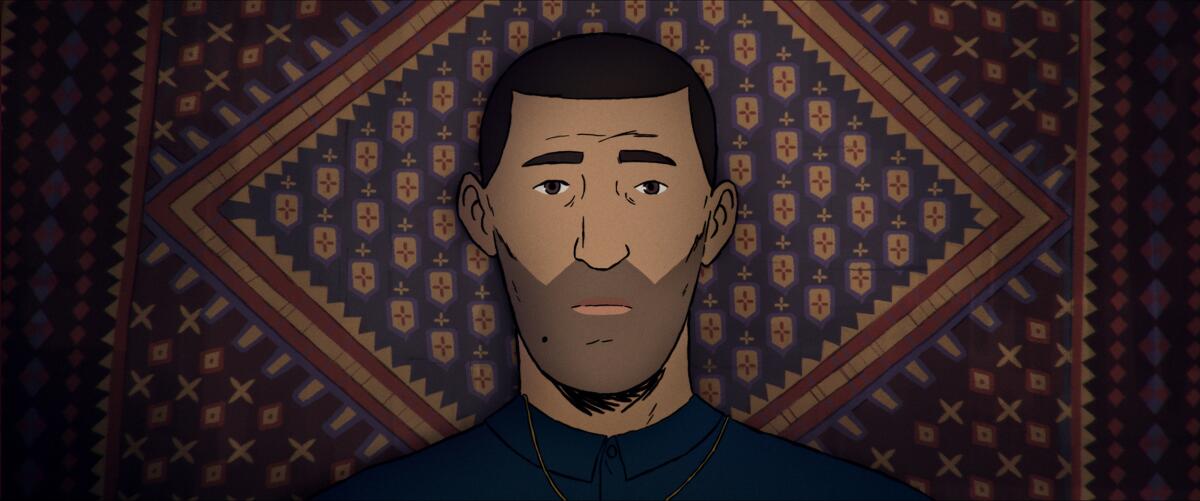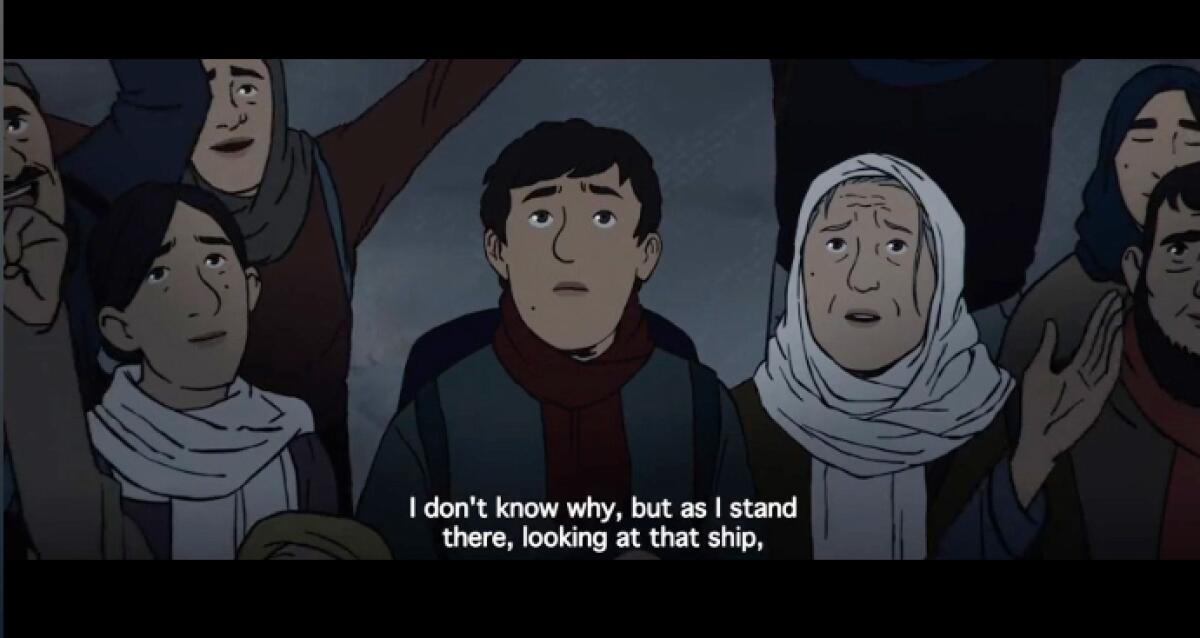The star of Oscar-nominated ‘Flee’ gives his first interview: ‘I wanted my story to be seen’

- Share via
Several years ago, Amin Nawabi sat for a series of interviews with friend and filmmaker Jonas Poher Rasmussen with a caveat: In telling his story, his identity would remain private to the world, freeing him to speak openly about his harrowing experiences as a child refugee escaping war-torn Afghanistan in the 1990s.
His stories were powerful, humorous, painful and complex, and in the course of confronting the past Nawabi revealed a secret he’d held close for decades. Rendering interview footage and his subject’s memories in animated form, Rasmussen transformed Nawabi’s gripping personal saga into the critically acclaimed film “Flee,” a historic triple nominee at the 94th Academy Awards, where it is the first feature to vie in documentary, animation and international categories.
But despite putting a face to the often abstract refugee experience, Nawabi — who appears in the film under a pseudonym — has maintained his identity and his privacy, forgoing media appearances and interviews about the film. Until now.
Appearing in his sole interview, in conversation with Academy Award nominee and executive producer Riz Ahmed, the subject and star of “Flee” shared why he chose to open up to Rasmussen, his own emotional reaction to seeing the film in a movie theater with an audience and the only complaint his now-husband had after watching it.
“I really wanted my story to be seen by people because the stories that we’ve seen about refugees don’t often open avenues for people to identify with refugees in general,” Nawabi told Ahmed. “I was hoping that my story would bring some kind of nuance to that picture.” (Watch the exclusive — animated — interview above.)

Acquired out of Sundance and released nationwide by Participant and Neon earlier this year, the film connected with critics and audiences across the world with its empathetic telling of Nawabi’s escape from Kabul as a young boy with his mother and siblings. Along the way, the now grown Nawabi grapples with the invisible scars left behind by the lasting traumas of his years of survival and hiding.
Ahmed — a 2021 acting Oscar nominee for “Sound of Metal” and this year up for his second career nomination for the live action short “The Long Goodbye” — was brought onto the project in 2020 by Suroosh Alvi of Vice Studios. For him, watching the film was an emotional experience. Its message aligned with the mission of his company Left Handed Films. “And on top of that, it’s so rare for a film to be so creatively innovative,” he said.
Danish filmmaker Jonas Poher Rasmussen tells his childhood friend’s challenging story with a blend of animation and authenticity.
It also felt extraordinarily timely, coinciding with the U.S.’s withdrawal from Afghanistan and the 20-year mark since the beginning of the war on terror, and offered viewers a way into thinking about the escalating refugee crisis in Europe. Since its release the film has only grown in relevance to current events and how refugee experiences are humanized, or not, in media narratives.
“There’s something really startling about what’s been happening with Ukraine, just as there was something for many of us so startling happening during the war on terror as well,” said Ahmed. “And I think some people have picked up on the dissonance between the two responses around refugees who come from different countries.”

More than anything, Ahmed says, “Flee” itself felt like an act of bravery. Before meeting Nawabi, he wondered if the process of sharing his story brought the Denmark-based academic, who is credited as co-writer, some catharsis.
“I feel that the act of telling a story itself is a hopeful act. It’s an attempt to find meaning,” said Ahmed. “And the sharing of your experience is a hopeful act because you’re putting it out there in the hope that people will connect to it.”
When the two met via video chat in December — Ahmed with his camera on from London, Nawabi appearing offscreen from Denmark — the two spoke for more than an hour. Copenhagen-based Sun Creature Studio, one of the film’s producers, then animated Nawabi’s side of the conversation.
Ahmed didn’t even mind not seeing Nawabi’s face during their meeting: “He shared so much of himself already, it feels right we allow him the dignity of privacy.”
A film like “Flee” that brings viewers into Nawabi’s lived experience — and the joy, pain and humanity layered within his story — is now even more important for the ways in which it obliterates stereotypes and harmful narratives around refugee communities, said Ahmed. “It’s a reminder of our common humanity.”
When newspaper columnists and TV correspondents express shock at European conflict, they reveal a damning belief that war is acceptable elsewhere.
More to Read
Only good movies
Get the Indie Focus newsletter, Mark Olsen's weekly guide to the world of cinema.
You may occasionally receive promotional content from the Los Angeles Times.













